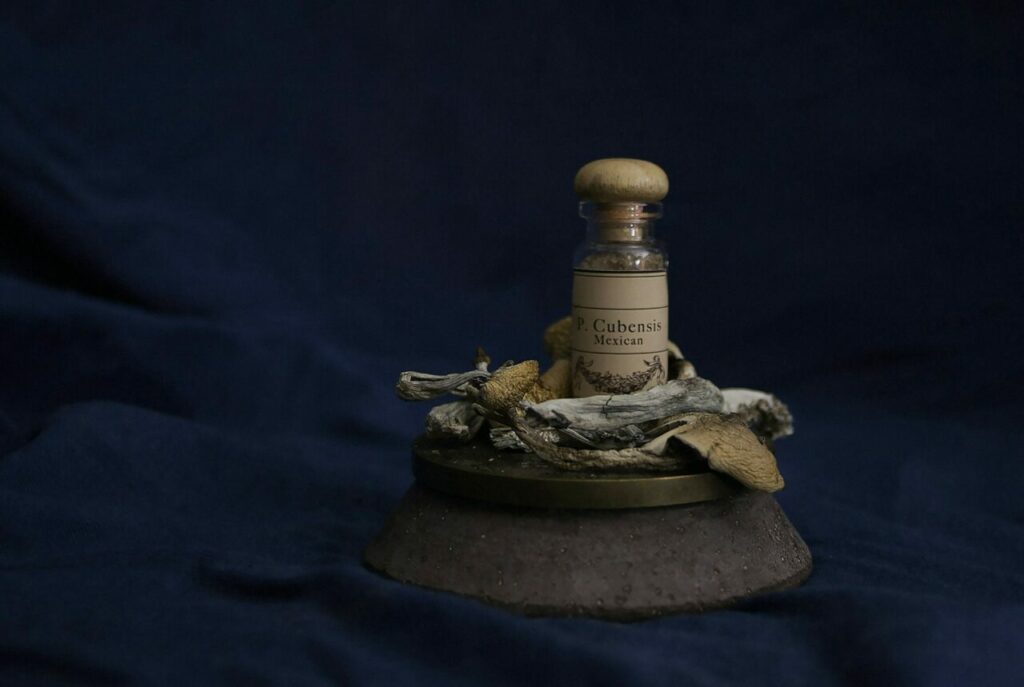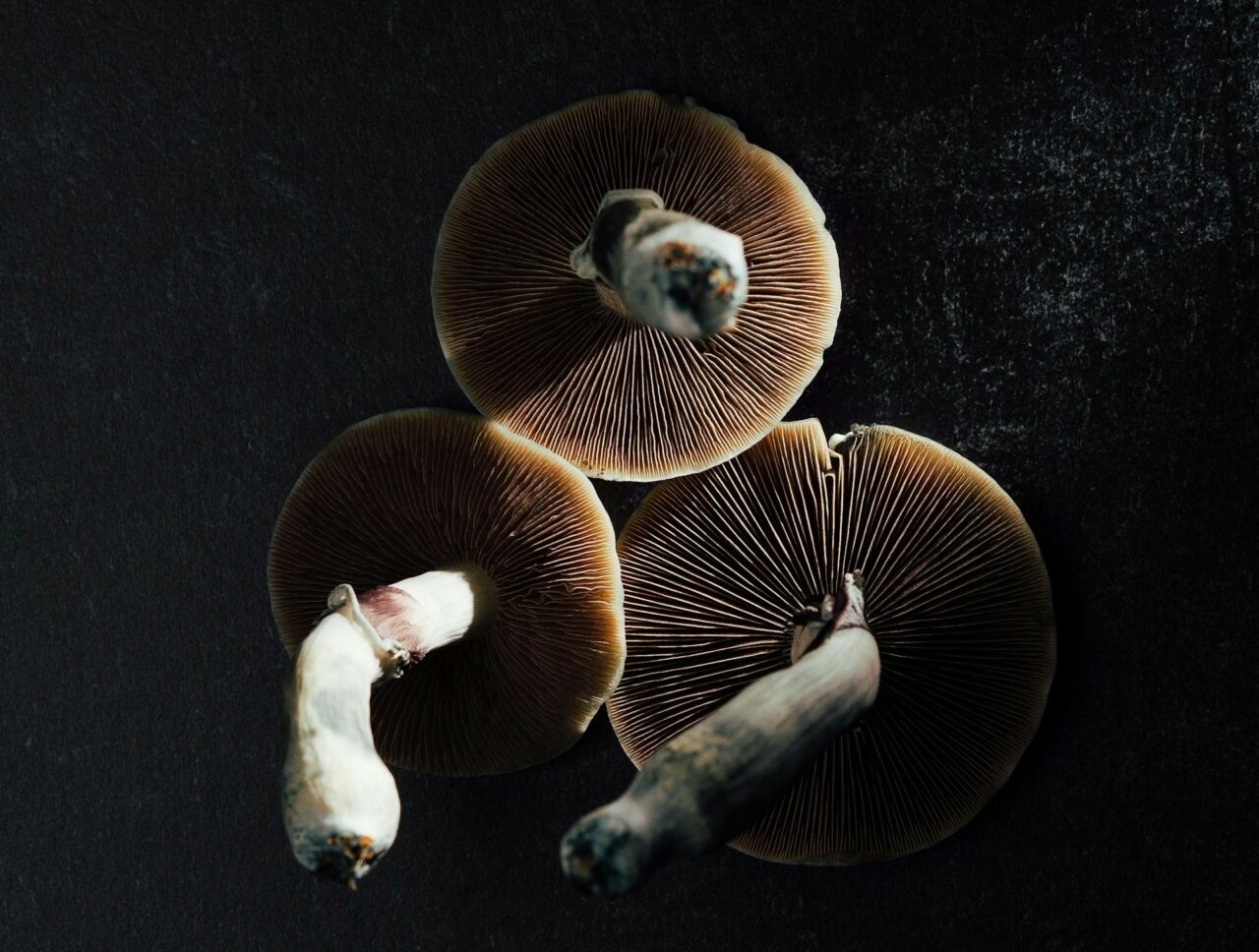As the fascination for natural magic mushrooms in Canada escalates, there has been a simultaneous surge in the popularity of lab-produced psilocybin products. The guaranteed dosage of these lab-created products appeals to many researchers. However, they might not realize that natural mushrooms may have a higher potency than their pharmaceutical equivalents. Experts have underscored substantial differences between the two, including discrepancies in strength.

Key Takeaways:
- More than 180 species of natural mushrooms provide varying degrees of potency, influenced by factors such as the species, consumption method, cultivation process, and individual tolerance.
- Synthetic psilocybin, a lab-manufactured version of the natural compound, is produced in controlled settings to ensure uniformity and purity for clinical studies, particularly in the field of mental health treatments.
- The combined effects of several compounds found in psychedelic mushrooms, like psilocin and baeocystin, may lead to a more potent and profound experience than that offered by a single compound alone.
Emerging Market: Psychedelics in Various Forms
Psilocybin mushrooms are gaining popularity in Canada, particularly as treatments for specific mental health disorders such as OCD, depression, PTSD, and anxiety. With this growing interest, provincial governments are beginning to contemplate the decriminalization of its recreational use.
In 2020, Canada legalized the limited medical use of these mushrooms under particular conditions. More recently, the federal government permitted certain terminally ill patients to use these substances to alleviate their symptoms.
These progressive changes have paved the way for the advent of synthetic psychedelics.
The Unfolding Debate
The continuing discussion on organic versus lab-synthesized psychedelics revolves around safety, availability, and cost considerations.
Many contend that natural psychedelics provide a more comprehensive and traditional experience. Conversely, advocates for lab-created versions point out their ease of standardization for medical purposes, along with guaranteed dosage control and quality checks.
While lab-generated psychoactive substances could expand access, there are ongoing worries about potential drug monopolization. Critics caution that this could result in less accessibility and increased expenses for users.
/wp:paragraph –>A Comprehensive Overview of Psilocybin
Psilocybe cubensis, a variant of magic mushroom, is among the myriad naturally existing psychedelic substances accessible today. Magic mushrooms, recognized for their mind-altering effects, are available in multiple strains such as Golden Teachers, Amazonian Cubensis, and Blue Meanies, with Psilocybe cubensis being the most well-known family.
Deciphering the Psychedelic Procedure
Psilocin, a derivative of this mushroom, transforms into a distinct chemical when metabolized by the liver. This novel compound interacts with the serotonin receptors in the brain, notably the 5-HT2A receptor.
This receptor is integral to mood regulation, cognitive functions, and perception. Its interaction with the new compound disrupts the standard functioning of serotonin pathways, leading to modified visual and auditory perception, alterations in thought processes, and emotional states. This event culminates in an enhanced mood, heightened creativity, introspection, and the trademark “psychedelic” experiences.
Two Key Categories
| Natural | Present in more than 180 fungus species, the potency varies depending on the mushroom species. Psilocybe cubensis is a common type. The effects can vary based on consumption techniques, cultivation methods, and individual tolerance. |
| Synthetic | Manufactured in labs and chemically identical to natural compounds. They are produced in controlled environments to guarantee consistency and purity. These are increasingly being explored for clinical uses, particularly in mental health treatments. |
Contrasting Nature’s Offering and Science’s Innovation: The Fundamental Differences
Naturally occurring versions of these drugs are present in certain species of magic mushrooms. Indigenous communities in North and South America have utilized these mushrooms in their rituals and ceremonies, treating them as sacred or divine.
- Sourced from plants and mushrooms
- Employed in ancient rituals and healing techniques
- The unique genetic composition of each strain contributes to its potency
In contrast,
A synthetic drug is
A substance resembling the organic molecular structure of a specific compound. These substances, meticulously engineered by expert pharmaceutical professionals in strictly regulated environments, ensure the utmost precision. Despite their similarity to natural drugs, they can alter the overall psychedelic experience.
- Formulated by experienced pharmaceutical experts
- Modern advancements aimed at medical applications
- Consistent potency ensured by a standardized production process
Natural substances, due to their bioactive compounds, offer additional advantages. Various types of mushrooms contain different levels of psilocybin and other compounds, leading to a wide range of effects.
Findings from Research Studies
A study carried out by the Hebrew University revealed that psychedelic mushrooms produce more potent and longer-lasting effects on synaptic plasticity compared to their synthetic counterparts. The research team evaluated the drug’s effect on mice brain activity by monitoring changes in behaviour and specific brain chemicals.
The study discovered that the extract reduced head twitches in mice and promoted the formation of new brain connections. This suggests that mushroom extract could offer advantages over a single compound.
The team of researchers introduced the idea of the “entourage effect”. This term refers to the phenomenon where the combined effect of multiple compounds in psychedelic mushrooms exceeds the impact of individual compounds. In terms of mushrooms, compounds such as psilocin, baeocystin, and other tryptamines may synergistically produce a profound experience.
These additional compounds are absent in lab-made substances, potentially leading to minor differences in effects, even if the psychedelic content remains the same.
Specialist Opinions on Nature’s Superiority
Research consistently shows promising results for the use of psilocybin—in any form—in treating various psychiatric disorders. A 2024 study examining the effects of controlled substances on patients with treatment-resistant depression found a decrease in symptoms following the administration of magic mushrooms.
When combined with other treatments, organic psychedelics could facilitate deeper emotional processing and insights during therapy sessions, thereby enhancing long-term results.
Scientists from the same university found that hallucinogenic mushrooms boost synaptic plasticity. They possess a unique metabolic profile that affects oxidative stress and energy production pathways, unlike lab-produced psychedelics.
Implications for the Market
The growing volume of research on this subject could affect how Canadians view and buy psychedelics. Preliminary efforts by Health Canada, such as the Special Access Program, are showing promising indications of leading the way for legalization and revolutionizing the therapeutic landscape. Psilocybin-assisted therapy may become a primary treatment method in the near future.
As we progress towards fully harnessing the power of organic psychedelics, the importance of organic options in clinical trials and therapeutic settings is expected to rise. This will likely lead to significant progress in mental health treatments.
Steps to Safely Procure Shrooms in Canada
- Through Section 56 Exemption: Health Canada recognizes that psilocybin may be used as an alternative treatment for patients with severe medical conditions. This exemption is part of the Controlled Drugs and Substances Act.
- Clinical Trials: Initial clinical trials are approved to investigate the potential of this drug in treating mental health disorders. Participants must meet specific requirements and undergo screening by a physician.
- Online Market: Psilocybin capsules or edibles can be purchased from online sellers in Canada, but it’s crucial to ensure they are from reputable sources.
Experience the Power of Natural Compounds
Nature is full of marvels, including shrooms. Rather than turning to synthetic psychedelics, consider the naturally potent magic mushrooms from Canada. They are both potent and therapeutic. Discover the highest quality, naturally sourced shroom strains at Sero Canada.
The shrooms we have available for purchase not only meet the standard but far exceed it, maintaining their purest and most authentic form when dried. Order today and have your chosen products discreetly delivered right to your doorstep.
Frequently Asked Questions
What are baeocystin and norbaeocystin?
Both are tryptamine or indole alkaloids. They are chemically akin to psilocybin. These tryptamine derivatives act as secondary alkaloids in shrooms, enhancing the overall psychedelic experience, although to a lesser extent. Baeocystin and Norbaeocystin have similar chemical structures but differ in their psychoactive characteristics.
Are organic dried mushrooms included in capsules and edibles?
Products’ effects might vary depending on their origin. Online dispensaries offer products abundant in organic compounds, facilitating the full entourage effect. Capsules, usually filled with synthetic compounds, are often used in clinical trials and healthcare facilities.
Do natural psychedelics offer more profound experiences?
It’s crucial to understand that expecting a deep, meaningful experience from a natural psychedelic might indeed lead to such a result. This is because our expectations, which form part of the ‘set’, have the power to influence the journey’s direction. Natural psychedelics are frequently linked with ceremonial traditions, and this ritualistic setting can generate uniquely rewarding experiences. These experiences differ significantly from those experienced in clinical settings using synthetic compounds.





